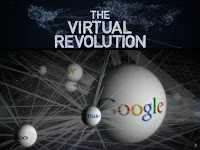Back in 1996 Larry Page and Sergey Brin realised the need of creating a service that classified all the information on the Web in a logical way so that it could be searched quickly when needed. This was the start of one of the most used search engine and one of the biggest companies in the world, Google.
Google now forms part of everyone's life, either as a search engine, mail provider, picture and video platform, as a mobile operating system or as any other service form its never ending list. But, do we really know what we are exposed to when we use any of Google's services?
 |
| Sergey Brin and Larry Page |
As shown in the BBC series "The Virtual Revolution" by Dr. Aleks Krotoski, Google controls a lot of information about us. As stated before, with every search we do on its search engine, Google knows our interests and problems; by using Google Maps, Google can know where we live, where we go... and that is not everything! Google even scans your emails if you are using its Gmail service so that it can, again, place some ads related to the content of your emails.
All this arises the question of how far Google is meddling in our personal privacy. If they keep information about our interests and information contained in our mails such as telephone numbers, addresses and names of friends, and this information is leaked and goes public we can be at a high risk if all these data fall into a stranger's hands.
In the episode "The Cost of Free" from The Virtual Revolution, a journalist of the New York Times could put name to a woman just by putting together the information of her search results. In 2006 AOL had released the search results of thousands of users which were just named by a numerical code. The journalist wanted to prove that even though the users were anonymous they could be identified just by its searches.
We trust Google when we use its services because we believe we do it privately and anonymously, however, the reality seems to be quite different. Despite Google's ethical codes we are still exposed to some risks when we make use of the services they offer. The concept of privacy has changed in the 21st century but we still have to think how far can these companies interfere in our private lives and whether there should be some kind of regulation as fas as the use of private data is concerned.
I deeply recommend watching the episode "The cost of free" from the BBC series "The Virtual Revolution". It is worth knowing more about how Google works and what it implies for all of us.
Here you find a clip of one of the episodes of "The Virtual Revolution": http://www.youtube.com/watch?v=ECLBQfLwD0s
A short speech of Google's Director of Communications.

No comments:
Post a Comment